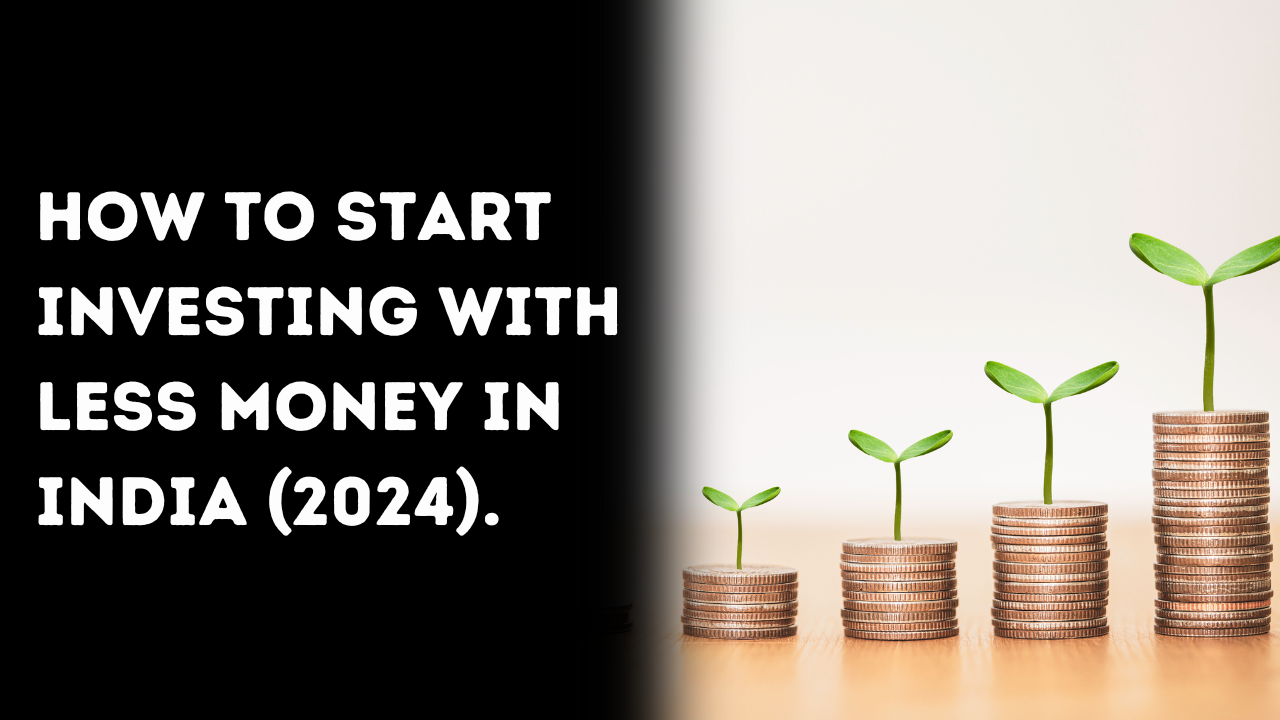How to Start Investing with Less Money in India (2024)
17 Jun 2024 4 mins Investing

Investing is crucial for financial growth and stability. Many in India believe you need substantial money to start investing, but this is a misconception. With the right approach, you can begin investing with a small amount. Here’s how to start investing with less money in India in 2024.
1. Set Clear Financial Goals
Before investing, set clear financial goals. Determine your investment purpose—retirement, home buying, or building an emergency fund. Goals guide your investment decisions and keep you focused.
2. Create a Budget
Budgeting is the first step in finding money to invest. Track your income and expenses to identify where to cut costs. Small savings add up and can be redirected towards investments.
3. Start with a Recurring Deposit (RD)
For new investors, a recurring deposit is a good start. Banks in India offer RDs, allowing fixed, regular deposits. It’s a low-risk way to build investment funds with guaranteed returns.
4. Use Micro-Investing Platforms
Platforms like Groww, Paytm Money, and ETMONEY let you start investing with small amounts. They offer investment options, including mutual funds and stocks, making it easy for beginners to start investing with as little as ₹100.
5. Invest in Mutual Funds through SIPs
Systematic Investment Plans (SIPs) in mutual funds are excellent for new investors with limited funds. Start with ₹500 per month. SIPs help in rupee cost averaging and offer compounding benefits.
6. Consider Public Provident Fund (PPF)
PPF is a popular long-term investment option in India with tax benefits under Section 80C. Start with ₹500 per year, providing safe, compounded returns.
7. Take Advantage of Employer-Sponsored Provident Fund (EPF)
If your employer offers EPF, contribute to it. EPF contributions are salary deductions, and employers often match these contributions, offering significant benefits.
8. Invest in Digital Gold
Digital gold allows small quantity gold purchases online. Platforms like Google Pay and PhonePe offer this service. It’s a convenient way to invest in gold without storage worries.
9. Automate Your Investments
Set up automatic transfers from your bank to your investment account. Automating investments ensures consistency and commitment to your financial goals.
10. Educate Yourself
Knowledge is power in investing. Read books, attend webinars, and follow financial news to educate yourself about different investment options and strategies. The more you know, the better your investment decisions.
FAQs
1. Can I start investing with just ₹500?
- Yes, many investment options like SIPs and RDs allow you to start with ₹500 or less.
2. What are the best investment options for beginners in India?
- SIPs in mutual funds, PPF, and recurring deposits are great for beginners due to their low risk and diversification.
3. How can I invest without taking on too much risk?
- Start with low-risk options like PPF and diversify your investments to spread risk.
4. Are micro-investing platforms safe?
- Yes, most micro-investing platforms in India are secure and regulated, but always research and choose reputable platforms.
5. How often should I review my investment portfolio?
- Review your investment portfolio at least annually or whenever there are significant changes in your financial situation or goals.
Conclusion
Starting to invest with less money is not only possible but also a smart financial move. By setting clear goals, creating a budget, and choosing the right investment options, you can begin your investment journey and work towards achieving your financial objectives. Remember, consistency and education are key to successful investing in India.
Get a Personal Loan that fits your needs. Apply for loans from Rs 1000 to Rs 15 Lakhs with competitive rates.
Find the Perfect Credit Card for your spending habits. Explore top credit cards and maximize your rewards.
Author- Ayush Naik
Ayush Naik is an expert in personal finance with an MBA in Finance. With over five years of experience working alongside stock market traders, Ayush has a deep understanding of market dynamics and investment strategies. His practical insights and analytical skills have helped many individuals navigate the complexities of financial planning and investment. Ayush’s professional background and commitment to educating others make him a valuable contributor to our personal finance blog.